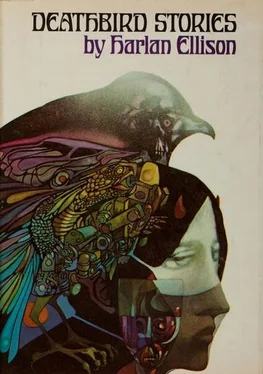He saw no other signs of life.
Save an occasional skeleton lying against a shadowed wall of orange rock. Often, they had no skulls.
He found a pass through the mountains, finally, and crossed. He went up through foothills into lower, gentle slopes, and then up again, into cruel and narrow passages that wound higher and higher toward the heat of the sky. When he reached the summit, he found the path down the opposite side was straight and wide and easy. He descended quickly; only a matter of days, it seemed.
Descending into the valley, he heard the song of a bird. He followed the sound. It led him to a crater of igneous rock, quite large, set low among the grassy swells of the valley. He came upon it without warning, and trudged up its short incline, to stand at the volcanic lip looking down.
The crater had become a lake. The smell rose up to assault him. Vile, and somehow terribly sad. The song of the bird continued; he could see no bird anywhere in the golden sky. The smell of the lake made him ill.
Then as he sat on the edge of the crater, staring down, he realized the lake was filled with dead things, floating bellyup; purple and blue as a strangled baby, rotting white, turning slowly in the faintly rippled gray water; without features or limbs. He went down to the lowest out thrust of volcanic rock and stared at the dead things.
Something swam toward him. He moved back. It came on faster, and as it neared the wall of the crater, it surfaced, singing its blue jay song, swerved to rip a chunk of rotting flesh from the corpse of a floating dead thing, and paused only a moment as if to remind him that this was not his, Talbot’s, domain, but his own.
Like Talbot, the fish would not die.
Talbot sat at the lip of the crater for a long time, looking down into the bowl that held the lake, and he watched the corpses of dead dreams as they bobbed and revolved like maggoty pork in a gray soup.
After a time, he rose, walked back down from the mouth of the crater, and resumed his journey. He was crying.
When at last he reached the shore of the pancreatic sea, he found a great many things he had lost or given away when he was a child. He found a wooden machine gun on a tripod, painted olive drab, that made a rat-tat-tatting sound when a wooden handle was cranked. He found a set of toy soldiers, two companies, one Prussian and the other French, with a miniature Napoleon Bonaparte among them. He found a microscope kit with slides and petri dishes and racks of chemicals in nice little bottles, all of which bore uniform labels. He found a milk bottle filled with Indian-head pennies. He found a hand puppet with the head of a monkey and the name Rosco painted on the fabric glove with nail polish. He found a pedometer. He found a beautiful painting of a jungle bird that had been done with real feathers. He found a corncob pipe. He found a box of radio premiums: a cardboard detective kit with fingerprint dusting powder, invisible ink and a list of police-band call codes; a ring with what seemed to be a plastic bomb attached, and when he pulled the red finned rear off the bomb, and cupped his hands around it in the palms, he could see little scintillas of light, deep inside the payload section; a china mug with a little girl and a dog running across one side; a decoding badge with a burning glass in the center of the red plastic dial.
But there was something missing.
He could not remember what it was, but he knew it was important. As he had known it was important to recognize the shadowy figure who had moved past the surgical lamp at the top of the navel shaft, he knew whatever item was missing from this cache…was very important.
He took the boat anchored beside the pancreatic sea, and put all the items from the cache in the bottom of a watertight box under one of the seats. He kept out the large, cathedral-shaped radio, and put it on the bench seat in front of the oarlocks.
Then he unbeached the boat and ran it out into the crimson water, staining his ankles and calves and thighs, and climbed aboard, and started rowing across toward the islets. Whatever was missing was very important.
The wind died when the islets were barely in sight on the horizon. Looking out across the blood-red sea, Talbot sat becalmed at latitude 38° 54’ N, longitude 77° 00’ 13” W.
He drank from the sea and was nauseated. He played with the toys in the watertight box. And he listened to the radio.
He listened to a program about a very fat man who solved murders, to an adaptation of The Woman in the Window with Edward G. Robinson and Joan Bennett, to a story that began in a great railroad station, to a mystery about a wealthy man who could make himself invisible by clouding the minds of others so they could not see him, and he enjoyed a suspense drama narrated by a man named Ernest Chapell in which a group of people descended in a bathyscaphe through the bottom of a mine shaft where, five miles down, they were attacked by pterodactyls. Then he listened to the news, broadcast by Graham MacNamee. Among the human interest items at the close of the program, Talbot heard the unforgettable MacNamee voice say:
“Datelined Columbus, Ohio; September 24th, 1973. Martha Nelson had been in an institution for the mentally retarded for 98 years. She is 102 years old and was first sent to Orient State Institute near Orient, Ohio, on June 25th, 1875. Her records were destroyed in a fire in the institution some time in 1883, and no one knows for certain why she is at the institute. At the time she was committed, it was known as the Columbus State Institute for the Feeble-Minded. ‘She never had a chance,’ said Dr. A. Z. Soforenko, appointed two months ago as superintendent of the institution. He said she was probably a victim of ‘eugenic alarm,’ which he said was common in the late 1800s. At that time some felt that because humans were made ‘in God’s image’ the retarded must be evil or children of the devil, because they were not whole human beings. ‘During that time,’ Dr. Soforenko said, ‘it was believed if you moved feeble-minded people out of a community and into an institution, the taint would never return to the community.’ He went on to add, ‘She was apparently trapped in that system of thought. No one can ever be sure if she actually was feeble-minded; it is a wasted life. She is quite coherent for her age. She has no known relatives and has had no contact with anybody but Institution staff for the last 78 or 80 years.’ “
Talbot sat silently in the small boat, the sail hanging like a forlorn ornament from its single centerpole.
“I’ve cried more since I got inside you, Talbot, than I have in my whole life,” he said, but could not stop. Thoughts of Martha Nelson, a woman of whom he had never before heard, of whom he would never have heard had it not been by chance by chance by chance he had heard by chance, by chance thoughts of her skirled through his mind like cold winds.
And the cold winds rose, and the sail filled, and he was no longer adrift, but was driven straight for the shore of the nearest islet. By chance.
He stood over the spot where Demeter’s map had indicated he would find his soul. For a wild moment he chuckled, at the realization he had been expecting an enormous Maltese Cross or Captain Kidd’s “X” to mark the location. But it was only soft green sands, gentle as talc, blowing in dust-devils toward the blood-red pancreatic sea. The spot was midway between the low-tide line and the enormous Bedlam-like structure that dominated the islet.
He looked once more, uneasily, at the fortress rising in the center of the tiny blemish of land. It was built square, seemingly carved from a single monstrous black rock…perhaps from a cliff that had been thrust up during some natural disaster. It had no windows, no opening he could see, though two sides of its bulk were exposed to his view. It troubled him. It was 11 dark god presiding over an empty kingdom. He thought of the fish that would not die, and remembered Nietzsche’s contention that gods died when they lost their supplicants.
Читать дальше












